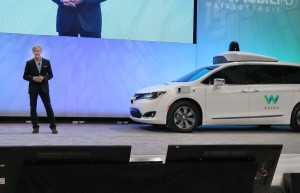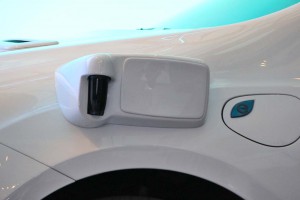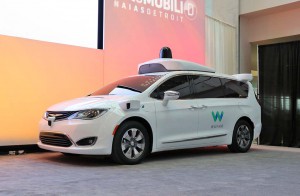
Waymo CEO John Krafcik with the specially modified Chrysler Pacifica Hybrid using the tech firm's latest autonomous technology.
Waymo, Google’s autonomous vehicle subsidiary, will start testing a fleet of specially modified Chrysler Pacifica minivans in Arizona and California later this month, moving a big step closer to reaching the point it can start moving its self-driving technology from prototype to production, CEO John Krafcik said during an appearance at the North American International Auto Show in Detroit Sunday.
That was one of several big announcements made by Krafcik during his appearance at the annual NAIAS. Krafcik also noted that Waymo is now producing the various LIDAR – 3D laser – cameras, radar sensors and other hardware used for its autonomous vehicle technology. That has helped it drop costs by as much as 90% and speed up the development process.
“This future isn’t very far away,” said Krafcik, a former Hyundai Motor America chief executive, adding that Waymo’s goal is “building cars that can help millions of people every day.”
(Honda’s self-driving NeuV concept could earn you money on the side. Click Here for more.)
Virtually all of the major automakers — as well as key suppliers and many of the new automotive start-ups – are working on self-driving, as well as fully driverless, vehicle systems. Waymo is considered by many experts to have a significant lead in the development process. Since the project was launched by Google eight years ago its vehicles have logged nearly 3 million miles of real-world testing, and Krafcik said that will accelerate as the 100 modified Chrysler Pacifica Hybrid minivans begin to go into operation.
The units will first be tested in warm weather climates like Arizona and California, but they are subsequently expected to be used in more challenging situations, such as a Michigan winter, Waymo officials have said.
(Sneak peek: Click Here for a look at the vehicles debuting at the Detroit Auto Show this week.)
Krafcik noted that the minivans will use the latest-generation autonomous hardware, which Waymo has decided to build itself. That will give it a better opportunity to control quality, drive down costs and ensure that the LIDAR and other sensors are properly integrated into the tech firm’s software, said Sam Abuelsamid, an analyst with Navigant Research.
“That way, they can optimize the software to cover for any (problems) with the hardware,” he told TheDetroitBureau.com.
Bringing down the cost of all that technology will be critical, analysts believe, and Waymo’s Krafcik said the company is making significant progress. Each of the many LIDAR units on Google’s original prototypes cost about $75,000 apiece. That has come down 90% with the new hardware suite, Krafcik revealed, adding that it still must come down a lot further to be ready for mass production, but “scale,” he stressed, will help.
The new sensors are not just cheaper but more capable. A new, long-range LIDAR unit “not only can see a football helmet but see it two football fields away,” said Krafcik, adding that the new short-range laser system can tell which way a pedestrian is facing, making it easier to predict whether they might walk in front of the vehicle.
One of the questions left unanswered by Krafcik is what Waymo’s long-term business plan is. While he talked about helping “millions” of people “every day,” reducing highway fatalities and giving the handicapped greater mobility, it remains unclear what Waymo plans to sell – and to whom.
Until recently, there had been speculation the company would try to build its own vehicles, but Krafcik appeared to rule that out last year, instead saying he would seek deals with existing carmakers. The first was with Fiat Chrysler Automobiles, while a second, preliminary alliance with Honda was announced last month.
“What we’re bringing to market is a self-driving platform,” the CEO said during his speech. “Some we may do on our own. Some we may do with partners like FCA, Honda and others.”
But precisely what Waymo would do with those partners is uncertain. The FCA deal appears to have involved solely the purchase of 100 minivans, for example.
Analyst Abuelsamid said he would not be surprised if Waymo’s eventual goal is to simply buy vehicles from existing automakers – possibly even having those carmakers develop customized products solely for the tech firm. In turn, Waymo “would autonomous vehicle services,” such as car- or ride-sharing. Abuelsamid said he doesn’t see Waymo selling cars on the retail automotive market, at least not anytime soon.
Krafcik will be speaking again during auto show week and may then provide more details about the company’s cryptic plans.
(Click Here to check out how Toyota is trying to “humanize” its new autonomous Concept-i.)


